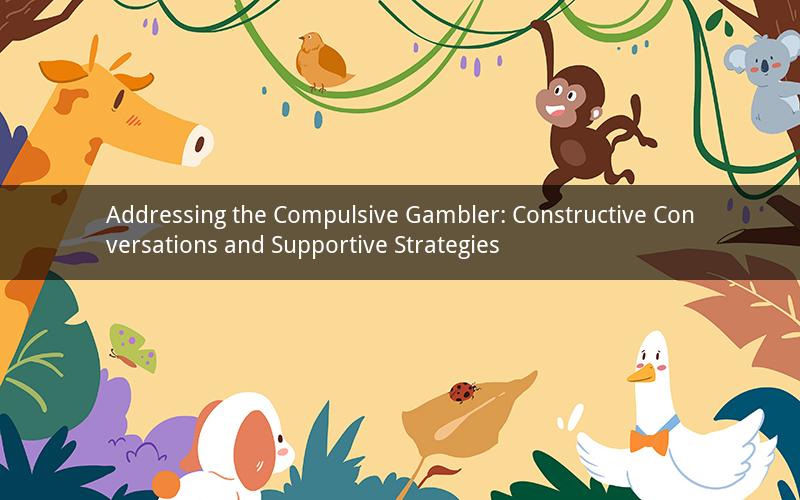
Introduction:
Gaming has become an integral part of modern society, providing entertainment and a sense of excitement. However, for some individuals, gambling can develop into a compulsive behavior, leading to significant negative consequences. When interacting with a compulsive gambler, it is crucial to approach the conversation with empathy, understanding, and constructive guidance. This article aims to provide insights into what one can say to a compulsive gambler, emphasizing supportive strategies and meaningful conversations.
1. Acknowledge the Problem:
It is essential to acknowledge the compulsive nature of gambling and its impact on the individual's life. This recognition can help create a foundation for open and honest communication. Here's how you can approach this topic:
- "I understand that gambling has become a significant issue for you. It's important to address this and find a way to overcome it."
- "It's evident that gambling has taken a toll on your life. Let's work together to find a solution."
2. Offer Empathy and Understanding:
Empathy is a powerful tool when dealing with a compulsive gambler. It helps in building trust and encourages the individual to open up. Here are some ways to express empathy:
- "I can imagine how challenging it must be for you to control your gambling. You're not alone in this journey."
- "It's not easy to admit that gambling has become a problem. I'm here to support you and help you through this."
3. Encourage Professional Help:
Seeking professional help is a crucial step in overcoming compulsive gambling. Here's how you can encourage the individual to seek help:
- "I believe that professional support can make a significant difference in your recovery journey. Let's explore treatment options together."
- "It's important to remember that seeking help is a sign of strength, not weakness. I'm here to support you in finding the right resources."
4. Provide Constructive Feedback:
Constructive feedback can help the compulsive gambler reflect on their behavior and understand the consequences. Here are some ways to offer feedback:
- "I've noticed that gambling has affected your relationships and financial stability. It's essential to address these issues and find healthier ways to cope."
- "It's crucial to set boundaries and create a support system to help you stay on track. Consider involving friends, family, or support groups in your recovery process."
5. Encourage Self-Reflection:
Encourage the compulsive gambler to reflect on their gambling behavior and its impact. This can help them gain a deeper understanding of their addiction. Here are some ways to promote self-reflection:
- "Take some time to think about why gambling has become a problem for you. Understanding the underlying causes can help you overcome it."
- "Consider the consequences of your gambling behavior and how it has affected your life. Reflecting on these aspects can provide valuable insights."
6. Offer Supportive Strategies:
Supporting a compulsive gambler involves providing practical strategies to help them manage their addiction. Here are some supportive strategies you can suggest:
- "Consider setting strict limits on your gambling activities and avoiding high-risk situations."
- "Seek out alternative activities that can provide you with similar excitement and fulfillment without the negative consequences of gambling."
7. Maintain Patience and Encouragement:
Recovery from compulsive gambling is a gradual process, and setbacks may occur. It is crucial to maintain patience and provide ongoing encouragement. Here are some ways to show support:
- "Recovery takes time, and setbacks are a part of the journey. Remember that I'm here to support you every step of the way."
- "Your efforts to overcome this addiction are commendable. Keep up the good work, and I believe in your ability to recover."
Questions and Answers:
1. Q: How can I approach a compulsive gambler without making them defensive?
A: Approach the conversation with empathy and understanding, focusing on the issue rather than the individual. Avoid accusatory language and express your concerns in a non-judgmental manner.
2. Q: Can I confront a compulsive gambler about their behavior?
A: Confrontation may not be the most effective approach. Instead, try to have a calm and open conversation, expressing your concerns and offering support without being confrontational.
3. Q: What should I do if the compulsive gambler refuses to seek help?
A: Continue offering support and encouragement, emphasizing the benefits of seeking help. Consider involving a professional or support group to provide additional guidance.
4. Q: How can I help a compulsive gambler rebuild their relationships?
A: Encourage the individual to communicate openly with their loved ones, express remorse, and work on rebuilding trust. Offer to accompany them to counseling sessions or support groups.
5. Q: Is it possible for a compulsive gambler to recover completely?
A: Yes, recovery from compulsive gambling is possible with proper treatment and support. It requires commitment, dedication, and ongoing efforts. Encourage the individual to stay focused on their recovery journey.